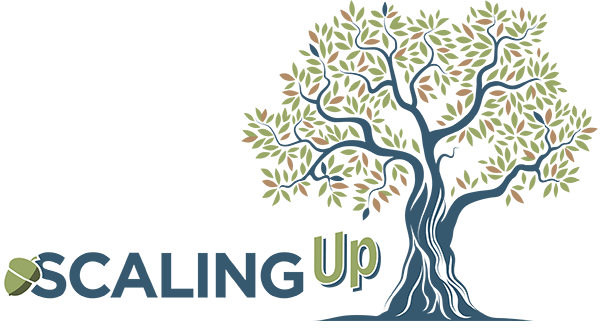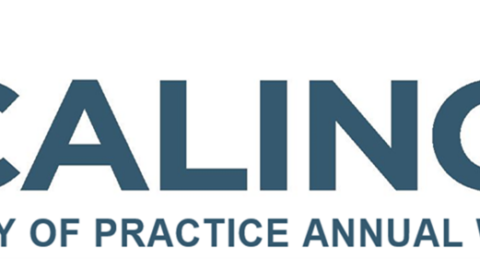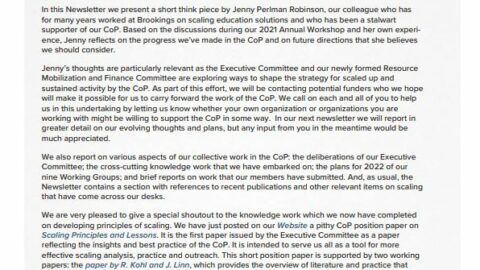By: María Boa, CIMMYT (m.boa@cgiar.org)
The Global CoP on Scaling Development Outcomes started a webinar series on cross-cutting issues. One of these is the relationship between scaling and systems. In this framework, and based on last year’s annual meeting, the Agriculture and Rural Development (ARD) working group (WG)[1] organized a webinar focusing on examples from agriculture in Africa where scaling and systems change are coming together. The webinar started with a welcome and introduction by Lennart Woltering, inviting members to keep track of future activities and non-members of the CoP to join the ARD WG. He also invited participants to check out the issue paper on Scaling and Systems by R. Kohl.
Richard Kohl opened the webinar by presenting key considerations about the breadth and depth of the changes needed to strengthen seed systems and scaling seed varieties, putting particular attention to the linkages between actors. It is critical to acknowledge who is consulted, who participates and who decides, and what resources and incentives drive these change. Moreover, partnerships, linkages and coordinators are generally considered essential but often overlooked and or considered too management intensive. One of the main questions that Richard put on the table was: “do actors have resources, incentives and methods to link and cooperate, and who coordinates this?”
Richard’s opening remarks helped to frame interesting presentations by our guest speakers. Mulemia Maina, managing director of a consulting firm specialized in developing strong seed systems (Agri-Experience), spoke about the effects of seed system improvements through the work with the Seed Control and Certification Institute (SCCI) of Zambia and the effect this had on scaling seeds by the Zambian private seed sector. The seed sector reforms of 1991 were a pivotal moment where the legal framework and policies were improved towards processes of liberalization, decentralization and licensing of seed systems, which resulted in increased interest from invested and private research, as well as a multistakeholder mobilization from multinational to national to local actors. Part of the success is based on the systemic capacity development from individuals like private and seed inspectors and samplers to organizations like seed testing labs to the enabling environment by setting high standards for academic qualifications, appropriate curriculum, and competitive training programs. Noticeably, as a result of the COVID-19 pandemic, SCCI shifted annual seed inspector training to online training. This required a new set of materials and virtual tools that opened the opportunity to double the number of participants and certifications. Now, they are working on the development of a virtual platform for training seed Inspectors, which will allow for cost-effective all year-round training not only for Zambia but to other countries like Mozambique and Malawi. Finally, Mulemia recognized that the formal seed systems to evolve and to scale seeds varieties requires time but more importantly constant dialogue among private and public stakeholders, quality standards, and policy should be developed in line with stakeholders’ needs in mind. Kate Fehlenberg, a member of the WG, wrote in the chat: “Zambia went from land-locked to land-linked”.
Gloria Otieno, genetic resources and food security policy specialist at the Alliance of Bioversity International and CIAT presented her work on informal /local seed systems and scaling interventions in Nepal and Uganda. A key feature of seed systems in developing countries is its iterative and integrated nature. Her research is based on addressing challenges to access to new/more resilient varieties and to quality seeds in markets, involving public-private partnerships. In the case of Nepal, the seeds sector is mainly informal. That is why the focus has been on strengthening the capacity and diversity of seed suppliers, institutions and relevant stakeholders, supported by an available genetic diversity and connected institutions and policies. As in the previous presentation, capacity development is critical from the local level (e.g. seed banks and farmer’s groups) to national agricultural extension services, national gene bank and seed quality control center. Some achievements are the registration of farmer’s varieties in the national seed system by a farmer-led process and increase of availability and diversity of quality seeds. In the case of Uganda, it is also an informal system but here they are upscaling citizen science for climate chains, where large groups of farmers test varieties and provide feedback on performance that result in the selection of varieties with high nutritional valued adapted to climate stress. A main highlight of her presentation was the focus of institutionalization of innovations through capacity development of several actors linked by partnerships and platforms in an enabling environment.
From the discussion, there were so many good questions, and we had a short time, but from a systems point of view, and thinking of Richard’s ‘closing the circle’, a colleague pointed out that it was interesting to see the seed certification as one subsystem interacting with others (variety design, discovery, selection, etc.), which together have enabled the outcome of quality seed being delivered to farmers. Mulemia’s reflected that this was the case in Zambia and recognize the different interactions among stakeholders for this to be successful. In both guest presentations, this enabling environment included regulatory frameworks that suited the context but also maintain quality standards and control, not only of the seeds but also of the individual, organizational and institutional competencies. It was interesting to learn more from different examples in Uganda, Zambia and Nepal where scaling and systems change are coming together, to mobilize global, local and people action. The link to the event recording is available here: https://scalingcommunityofpractice.com/scaling-and-systems-change-in-agriculture-responsible-scaling-in-african-seed-systems/
Finally, we had an informal gathering at Topia, a virtual chat room for the ARD WG to meet, exchange and have fun! We hope you can join us next time!
[1] Co-chaired by Julie Howard, Mark Huisenga, Frank Place, Maria Boa and Lennart Woltering.



